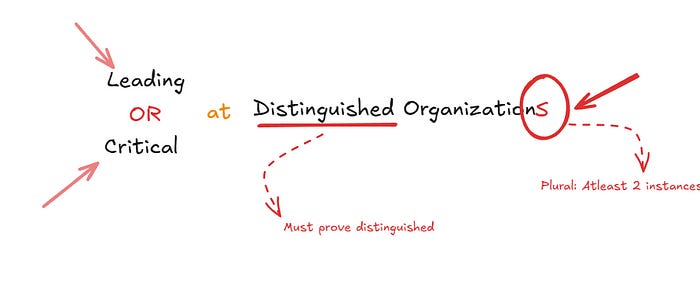How to Meet the Critical Role Criteria for EB1A
Breaking down most impactful criteria for EB1A petition
The critical role criterion for EB1A is one of my favorites. While your primary goal is securing a green card, the process of building your case often helps in your overall professional growth. It pushes you to articulate how your work impacts your company as a whole — a skill that is invaluable for career advancement.
Understanding the Critical Role Criterion
The official EB1A criterion states:
“Evidence that the alien has performed in a leading or critical role for organizations or establishments that have a distinguished reputation.”
This definition provides three key aspects to focus on:
Leading or Critical Role — You only need to prove one, not both.
Organizations or Establishments — The plural form implies that at least two instances must be demonstrated.
Distinguished Reputation — The organizations must be recognized as distinguished in their field
Since proving a critical role is often more straightforward than proving a leading role, let’s start there.
1a/Proving a Critical Role
You can establish that your role was critical by providing evidence that your work significantly benefited your organization. Some examples include:
Engineers:
An engineer who designed a tool that increased customer conversion rates by X%. The case should outline why acquiring more customers was important, how the tool was designed, and its measurable impact on the company.
An engineer who redesigned the architecture of a company’s payment systems, reducing latency and improving transaction efficiency.
Business/Financial Analysts:
A analyst/data scientist whose data analysis informed company strategy leading to decision to invest/divest in specific product or business area.
An analyst whose insights led to a major shift in company operations, improving efficiency and revenue.
1b/Proving a Leading Role
A leading role can be established by demonstrating that you held a title with responsibilities that indicate leadership. The USCIS Policy Manual explicitly states:
“A title, with appropriate matching duties, can help to establish that a role is (or was), in fact, leading.”
Keep reading with a 7-day free trial
Subscribe to EB1A Coach to keep reading this post and get 7 days of free access to the full post archives.




